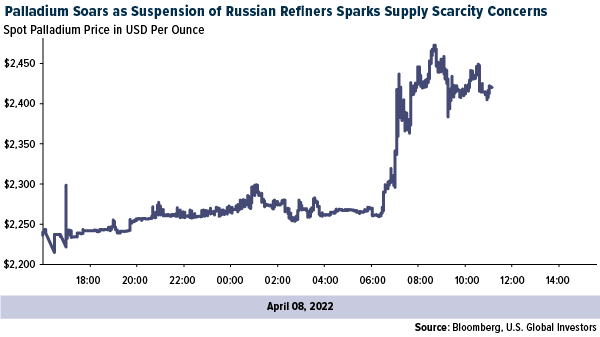Strengths
- The best performing precious metal for the week was palladium, up 6.28%. Palladium surged late Friday after the London market suspended two state-owned Russian refineries from its accreditation lists, potentially disrupting 40% of the world’s supply chain. However, China consumes about 30% of the world’s demand for palladium so it is possible Russia could bypass Zurich and London and ship directly to China.

- Canada's Centerra Gold Inc. has agreed to hand control of its expropriated gold mine to Kyrgyzstan's government. The agreement calls for Centerra to yield control of its owned subsidiary Kumtor Gold Co. and an affiliate to state-owned refiner Kyrgyzaltyn OJSC. In exchange for control, Kyrgyzaltyn is to transfer its 26% stake in Centerra back to the Canadian company, which plans to cancel the shares. The minority stake is valued at about (CA) $972 million, equivalent to $776 million USD. Centerra will pay $36 million for the shares to Kyrgyzaltyn and to Canadian tax authorities alongside other potential payments.
- Exchange-traded funds added 176,458 troy ounces of gold to their holdings, bringing this year's net purchases to 8.06 million ounces, according to data compiled by Bloomberg. The purchases were equivalent to $339.8 million at the previous spot price. Total gold held by ETFs rose 8.2% this year to 105.9 million ounces, the highest level since February 18, 2021.
Weaknesses
- The worst performing precious metal for the week was platinum, down 1.21%, but still up on Friday with the London news. In what may be a double-edged sword, South African platinum miners’ output of nickel and copper could increase as much as 40% over the next 20 years, according to RMB Morgan Stanley. South African output of platinum group metals (PGMs) would decline by more than 25% over that period, but the PGM miners currently lack the sufficient plant capacity to process the base metals.
- UBS decreased its fiscal year 2022 estimated earnings forecasts for Northam by 34% following a disappointing first half result and revised management guidance. Lower earnings and cash flow resulted in a 20% cut to the group’s price target of R160 per share. As highlighted in its first read, group EBITDA missed UBS’ forecast by 40% during the period, with management cutting full-year production guidance by 9% to 680-710,000 ounces and lifting unit cost guidance by 14%.
- Gold jewelry demand in China, which has been hit by lockdowns in major cities and concerns over the spread of COVID, may take a few months to recover, according to London-based precious metals consultancy Metals Focus. Jewelry stores are closed in the provinces and districts under lockdown, although shops in areas with no lockdowns but with minor outbreaks are operating as normal, said Managing Director Philip Newman, citing feedback from colleagues in Hong Kong and Shanghai.
Opportunities
- Gold Road is buying DGO Gold, in an all-scrip offer of 2.16 Gold Road shares for every DGO Gold share, implying an offer price of A$3.55 per share and an equity value of about A$308 million on a diluted basis. The offer represents an implied premium 20% over the last trading day, Gold Road says. The offer is subject to an 80% minimum acceptance by DGO shareholders.
- Asante Gold Corp. announced it is entering an exclusive deal to purchase the Chirano Gold Mine in Ghana from Kinross Gold. The Chirano Gold Mine is located immediately adjacent to Asante’s Bibiani Gold Mine which is being brought back into production. Chirano will establish Asante as a gold producer with a growth pipeline that utilizes existing infrastructure.
- Kinross also announced the sale of its Russian portfolio to Highland Gold for a total $680 million in potential proceeds, of which $100 million will be received up-front and the balance paid over 2023-27.
Threats
- Sprott Resource Lending, who holds an $80 million credit facility as part of Ascot’s financing package ($20 million of which is already drawn) will not be releasing the remaining funds to Ascot, as the two sides cannot meet in agreement on terms. Sprott now requires 12 months of ore inventory to be in the Proven category, rather than Probable. Ascot’s reserve base is all classified as Probable
- Zimbabwe’s mining industry sees a funding shortfall of $10 billion over the next five years, a challenge compounded by erratic power supplies and exchange-rate volatility. While Zimbabwe has the world’s third-biggest reserves of platinum-group metals, plus gold, diamond and chrome mines, development has been stymied by political instability, economic collapse and rules that deter foreign investment.
- Natascha Viljoen, chief executive officer of Anglo-American Plc’s platinum business, said women do not feel safe working underground in South African mines. While the mining industry’s toxic culture is no secret, an explosive report from Rio Tinto Group in February laid bare the scale and severity of the problem. The abuse of women in mines from Australia to South Africa is increasing investor scrutiny of the world’s biggest mining companies.

